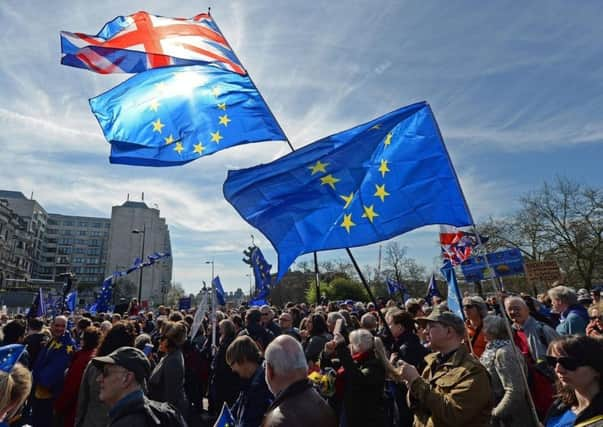'Enough of anti-Irish racism'


Some of what has been happening to Irish people who are being adversely affected in this way, including myself, amounts to anti-Irish racism. These unacceptable approaches, attitudes, verbal abuse and behaviours from extreme Brexiteers, stem from these people and groups believing that the Republic of Ireland is a pivotal player in the EU and is seeking to curtail Brexit from happening.
They assert that their understanding in this regard, arises from media coverage of the Irish government making representation on a range of fronts in regard to the EU withdrawal negotiations and most notably in respect of the Irish government seeking to curtail a return to having a border between Northern Ireland and the Republic of Ireland.
Advertisement
Hide AdAdvertisement
Hide AdThey seek in their anti-Irish verbal abuse, to lay blame upon myself and others personally for the Irish government asking questions about Brexit. The racists have been insistent that due to this, and my Irish ethnicity, I and my British born children should ‘go back to Ireland,’ even though I have lived here in England for 50 years, coming to live here aged five.
It is fact that the Irish government has rightfully made explicit their deeply held legitimate and reasonable concerns, that the imposition of a border not only has serious ramifications for the movement of people and for trade and other factors on the island, most importantly the fear it is will threaten the Good Friday Agreement with the imposition of borders, and through this it has the potential of reversing circumstances back to the terrible days that the Good Friday Agreement sought to bury once and for all.
The racism is not helped either by the fact that we have MPs not merely being uncivil towards the Irish Taoiseach, but whom are exhibiting offensiveness and racism towards the Taoiseach, describing his questioning and opposition towards having a border, as the Taoiseach being ‘typically Indian.’ People and entities holding power and influence can stoke the flames of animosity and racism, modelling thus its acceptability to susceptible others and in turn those with influence, have some responsibility for the widening of this offensiveness and the racism being exhibited and escalating towards the Taoiseach and towards ordinary Irish people including towards members of the South Yorkshire Irish community.
It is the case that the Irish government and their Taoiseach have every right to ask questions, because Brexit does not solely affect Britain. It has wide-ranging ramifications for the Irish residing on the island of Ireland - North and South - as well as the Ulster Scots community and other communities in Northern Ireland and also for the Irish diaspora living in England, Wales and Scotland also.
Advertisement
Hide AdAdvertisement
Hide AdIn more recent times, Government Ministers have been asserting, after the Windrush scandal, that the rights of the Irish in Britain after Brexit will not change under the terms of The Common Travel Area and the Ireland Act 1944, which stipulated that neither Ireland nor its citizens were ‘foreign’ for the purposes of UK law. Those expressing racism towards myself and other Irish people, say this suffices and therefore there is no case to be had in terms of Ireland and Brexit and the Irish diaspora in Britain.
However, the fact remains that The Common Travel Area is non-binding and confers no legal rights upon Irish or British Citizens, but a political agreement. Nor will it guarantee that the Irish in Britain will have ‘all of the access to benefits and services,’ it is merely a preferential migration regime. Here in Britain, the 1944 Act is also openly being described by migration experts as a ‘dead letter.’ They warn that it is highly unlikely that courts would accept that this Act exempts the Irish from the subsequent immigration legislation. Some experts point out that the only real protections for the Irish in Britain was under the terms related to their EU citizenship. Indeed, Simon Cox, a barrister leading on migration could not identify a single right conferred on Irish nationals by the 1944 Ireland Act.
Adding to this is the lack of clarity pertaining to children born of Irish parentage under Brexit and those Irish outside of the CTA who come to the UK to work and live. Simon Cox also notes that there will be nothing legally preventing Britain from excluding or deporting Irish passport holders from Northern Ireland, including those born there. This would be a blatant contravention of the Belfast Agreement as well as being wrong on so many different levels.
Caroline Nokes MP and the Minister for State and Immigration in response, to questions in Westminster put to her of late, on matters of parity in citizenship and rights, stated that Northern Ireland, residents of Irish ethnicity, seeking British citizenship ‘should have to go through the same process of naturalisation and citizenship as other third-country nationals.’ Yet the Belfast Agreement which she said she had not properly read, provides that ‘the people of Northern Ireland can identify themselves and be accepted as Irish or British, or both, as they may so choose.’